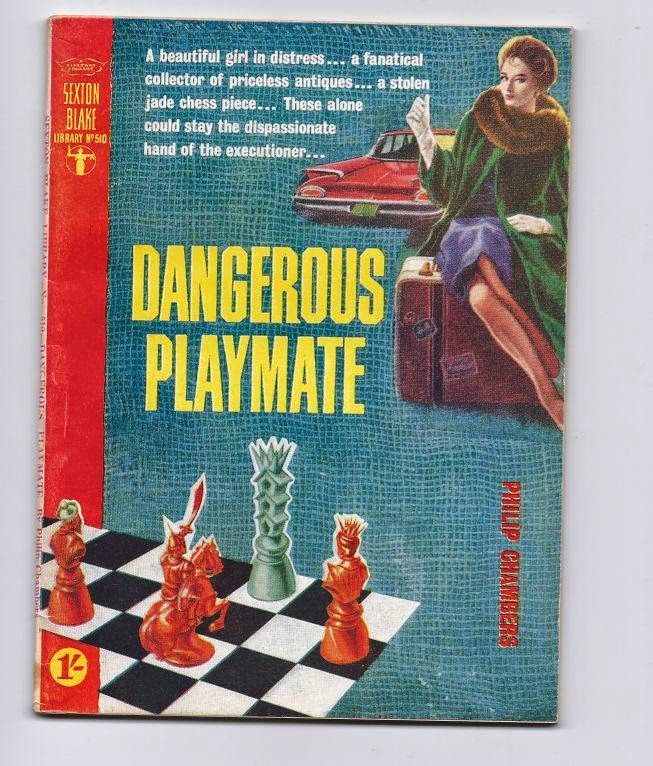 Of all the British pulpsters and paperbackers I've been covering in my forth-coming book, there have been only a few writers whose work I've really been fond of. I don't know why this is, but it's something I've been noticing for the past dozen years: I like American stuff more than British, and this is the case even with films and music. Give me The Sonics anytime over The Rolling Stones or The Dead Kennedys over The Sex Pistols!
Of all the British pulpsters and paperbackers I've been covering in my forth-coming book, there have been only a few writers whose work I've really been fond of. I don't know why this is, but it's something I've been noticing for the past dozen years: I like American stuff more than British, and this is the case even with films and music. Give me The Sonics anytime over The Rolling Stones or The Dead Kennedys over The Sex Pistols!But there are indeed some British crime writers whose work I really like. Kenneth Royce is one of them. He writes in clear prose that keeps the story moving, he creates interesting characters with just a few lines, they are likable even though they are not heroes, his plots are unpredictable and original. Too bad he's not very well known these days. I'm not sure if he's known at all. He does have a Wikipedia page, though. He's had three Finnish translations, all in pulpy paperbacks and with not interesting covers (see below).
Of the two translations, the first two have Royce's serial character, Spider Scott, as the hero. He's a former master burglar, who's gained his nick name with his skills in climbing. He climbs any wall. In the beginning of the first Spider Scott book, The XYY Man (1970; Ansa ilman muuta in Finnish; the original name comes from the "fact" that most of the male criminals have an extra chromosome). Scott is lured by some secret organization to break and entry the Chinese embassy or his brother's career in the police force is threatened. Spider Scott doesn't want that, so he complies - and has to kill the Chinese ambassador in order to stay alive. And now he has to flee everyone. This is a very intriguing thriller, to the last page.
 In the second Spider book, The Miniatures Frame (1972; Tie murhaan in Finnish), the plot is even more original. Spider is taken into a committee that's supposed to make the prisons better places for the prisoners. The head of the committee is a rich asshole who collects art and antique. Spider is lured by the man's teenage daughter into a secret chamber the man has in his house and Spider spots two extremely valuable miniature paintings he's stolen ten years ago! The man threatens Spider with the jail, but Spider fights back. Spider Scott was developed into a TV series, but I've never seen it.
In the second Spider book, The Miniatures Frame (1972; Tie murhaan in Finnish), the plot is even more original. Spider is taken into a committee that's supposed to make the prisons better places for the prisoners. The head of the committee is a rich asshole who collects art and antique. Spider is lured by the man's teenage daughter into a secret chamber the man has in his house and Spider spots two extremely valuable miniature paintings he's stolen ten years ago! The man threatens Spider with the jail, but Spider fights back. Spider Scott was developed into a TV series, but I've never seen it.The third translation, The Stalin Account (1983; Tappavat varjot in Finnish), is an interesting spy novel the plot of which starts in the 1920s and the attempt of the Soviet bolsheviks to turn Brits into communists and then spies for the Soviet Union. What follows is a tragic love story between a Soviet spy and a young British girl. The thing comes again alive in the early eighties when the woman of the love story dies almost entirely alone, nurtured only by her nephew. When the elderly woman dies, her diary also goes missing. It all ties around the story of Stalin's son, Jacob. It's a very interesting spy novel with believable characters and believable history.
I haven't read any other books by Royce, but I come across them, I'll be sure to take a look. George Kelley says in his entry for Royce in The St. James Twentieth Century Crime and Mystery Writers that some of Royce's best books are The President Is Dead (1988), Fall-Out (1989) and 10,000 Days (1981). The last one should prove interesting as it's about the ending of oil.









